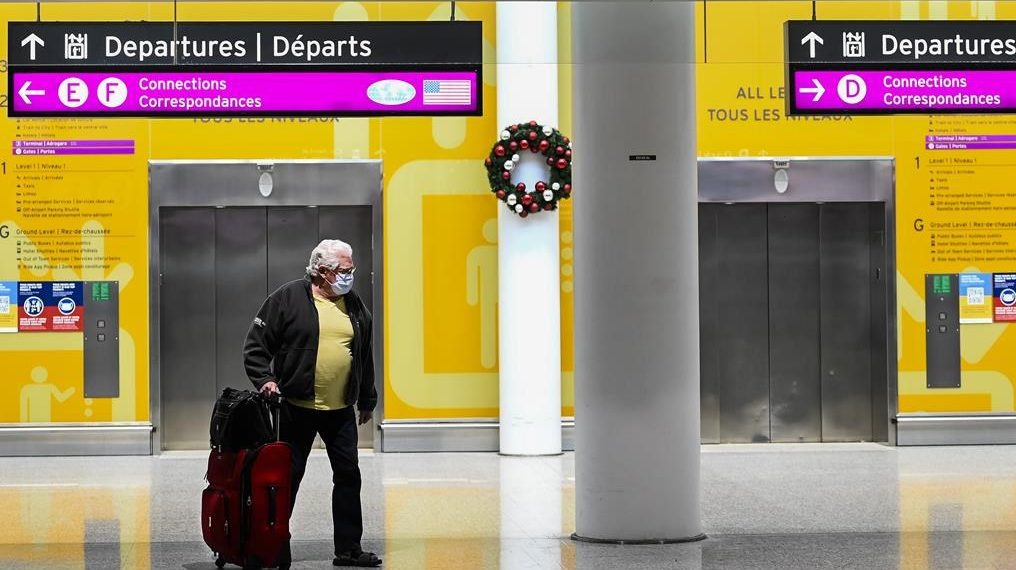As the federal government prepares to slap new restrictions on international travel, Health Canada data suggest a worrying uptick of infections directly connected to foreign arrivals.
While travel exposures account for less than two per cent of all Canada’s COVID-19 cases, the number of cases in recent travellers, and people they came into close contact with after arriving, shows continual growth in recent months.
In December, 486 cases of COVID-19 were diagnosed in recent travellers, the most since March and up from 312 in November and 204 in October. Despite mandatory two-week quarantines for international travellers, there were 1,258 COVID-19 cases confirmed in people who had close contact with a recent traveller in December, up from 744 in November and 704 in October.
In the first three weeks of January, 384 travel cases and 607 traveller-contact cases were confirmed.
The figures also correspond with a recent rise in the number of people travelling, at least by air. Land-border arrivals are typically fewer in the winter because of the weather in much of the country, but more people arrived from the U.S. by air in December than any month since March. Arrivals from other international locations were higher in December than any month except August.
Reports of notable Canadians ignoring pleas not to travel during the pandemic in favour of sun-kissed days on foreign beaches angered much of the country in the weeks after Christmas, and led to several high-profile provincial and federal politicians and health officials being fired, demoted or reprimanded.
Between Nov. 30 and Dec. 27, 86,953 people flew into Canada from the United States, and 184,260 arrived by air from other international locations.
Prime Minister Justin Trudeau has been promising for more than a week that the government will bring in stronger measures for international arrivals, as Canada fears the impact of new variants of COVID-19 that have arisen in other countries.
That is on top of a mandatory two-week quarantine for all arrivals, which has been in place since last spring, restricting international flights to just four airports, and a more recent requirement for foreign travellers to provide proof of recent negative COVID-19 tests within three days of boarding planes to Canada.
A spokesman for Health Minister Patty Hajdu said “Canada has some of the strongest border measures in the world” and all future measures will be guided by both science and evidence. Cole Davidson said 6,500 phone calls are made daily to verify travellers are in quarantine, and that 99 per cent of nearly 50,000 checks on quarantine made by police have found people are where they are supposed to be.
There are more than 50 cases of the new coronavirus variants from the United Kingdom and South Africa now confirmed in Canada, most, but not all of them, in people who recently travelled into Canada from those countries. The variants are believed to spread more easily, and in recent days concerns have arisen about whether they are more likely to cause serious illness or death.
Conservative Health Critic Michelle Rempel Garner said while community spread within Canada still accounts for the vast majority of this country’s cases, Canada has to do more at the borders. She said the most effective option is to impose a mandatory rapid COVID-19 test on all arrivals, and have that test repeated midway through the two-week quarantine period.
Rempel Garner said Canada can’t “hermetically seal” our border as island nations like New Zealand have done, so testing all travellers for the virus, screening them all for the variants, and maintaining the quarantine would be effective and more efficient than requiring travellers to quarantine at a hotel for two weeks at their own expense.
Similar rules have been in place in Iceland for months. Singapore began requiring testing at all airports on Jan. 24, along with using drones and electronic surveillance to monitor people in quarantine.
NDP Leader Jagmeet Singh said a trend in more travel-related cases is “alarming” and that Trudeau can’t wait any longer to act to stop it.
“With the catastrophic situation we are in, we cannot afford a spike because of non-essential travel,” Singh said.

A group of over 200 doctors, researchers, and advocates say Ontario must take urgent action to address the rising number of deaths due to COVID-19 in long-term care.
The group says in a letter released today that the situation constitutes a humanitarian crisis.
They say the province’s nursing homes are still seeing staffing shortages, poor infection control, and a delayed response to outbreaks.
The group is recommending the province bolster staffing immediately, legislate a minimum standard of daily care for residents, and provide unrestricted access to family caregivers with personal protective equipment.
They also want the province to begin the process of removing for-profit long-term care providers from the sector.
The Long-Term Care Ministry did not immediately respond to request for comment.
The government says that as of today 3,462 long-term care residents have died of COVID-19 since the start of the pandemic.
Ontario is reporting 1,740 new cases of COVID-19 today and 63 more deaths linked to the virus.
Health Minister Christine Elliott said there are 677 new cases in Toronto, 320 in Peel Region, and 144 in York Region.
More than 30,700 tests have been completed since Ontario’s last daily update.
Ontario is also reporting that 9,707 more doses of a COVID-19 vaccine have been administered since the last daily update.
A total of 295,817 doses of a COVID-19 vaccine have been administered in the province so far.
The first shipment of a COVID-19 vaccine is scheduled to arrive in one of 31 fly-in First Nations communities on Tuesday as part of Ontario’s Operation Remote Immunity.
Nishnawbe Aski Nation Grand Chief Alvin Fiddler said that the ORNGE air ambulance service will be delivering and administering the Moderna vaccine to Weenusk First Nation.
Weenusk is a largely Cree community of approximately 500 people in the Hudson Bay region of northern Ontario.
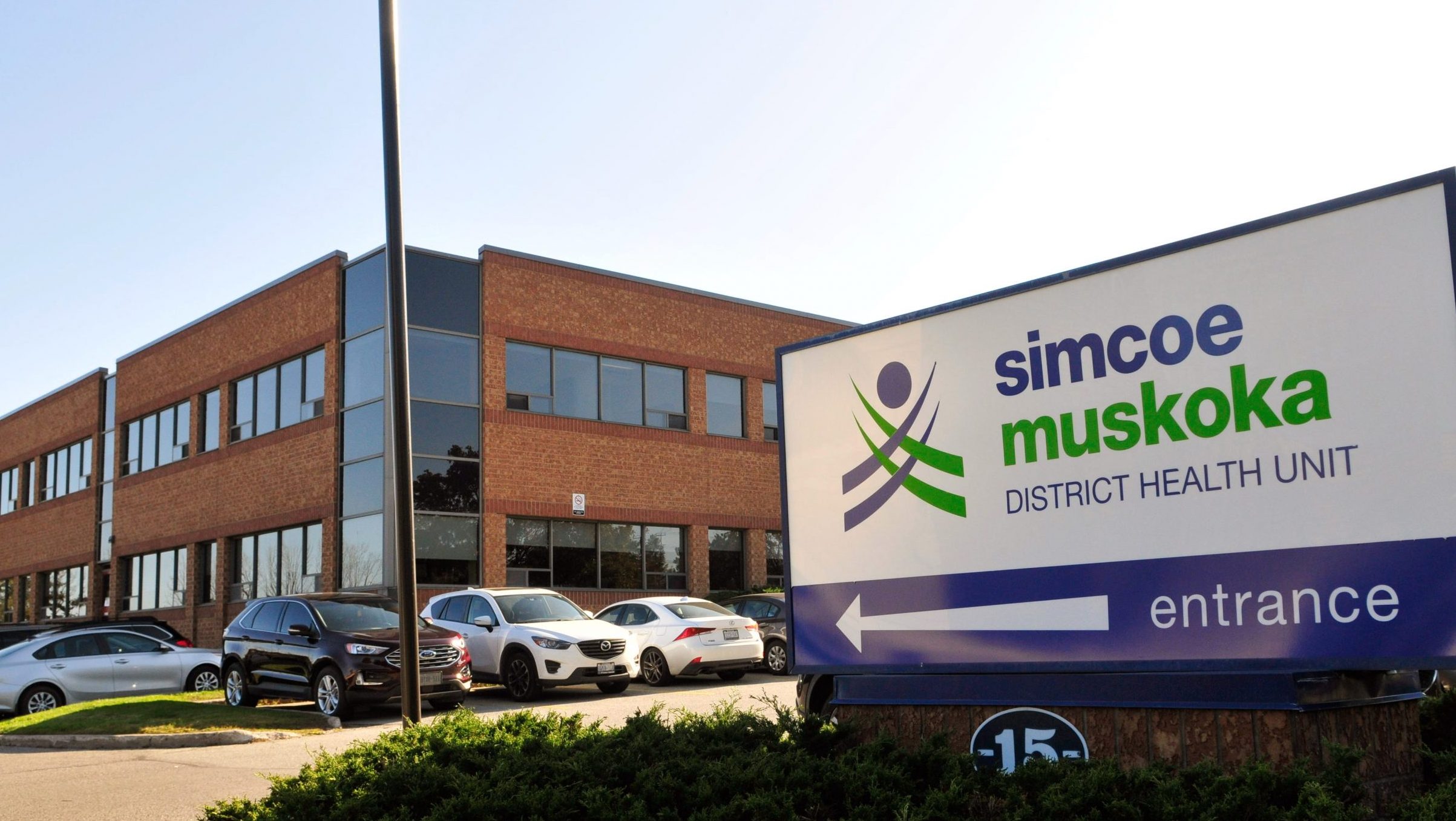
Public health officials say 99 more people who have tested positive for COVID-19 in the Simcoe-Muskoka region likely have the U.K. variant of the virus — which is more contagious and transmissible.
The Simcoe Muskoka District Health Unit (SMDHU) says most of the cases are linked to a deadly outbreak at Roberta Place Long-Term Care home in Barrie, that has killed 46 people and infected more than 200. The U.K. variant has already been identified in some of those infected in that outbreak.
But two of the new cases have no known link, including one that’s part of a small outbreak at a regional hospital.
“This certainly makes us concerned that the variant may be more widespread, and that in turn means that we need to really take public health measures that prevent spread of the virus much more to heart,” said Dr. Charles Gardner, medical officer of health for the SMDHU, in a release on Tuesday. He said if the variant isn’t already spreading in the community, it likely will be soon.
These probable cases are in addition to seven cases of the U.K. variant in the region, confirmed earlier via genome testing.
Six of those cases are people associated with the outbreak at Roberta Place. One case is a person who had close contact with someone who is also part of the outbreak at Bradford Valley Care Community, a long-term care home (LTCH) in Bradford West Gwillimbury.
The health unit is currently investigating if that outbreak is also due to the U.K. variant of COVID-19.
The latest data came from an ongoing study by Public Health Ontario that’s screening all positive COVID-19 tests from Jan. 20 for three new variants of the virus.
Local health officials say they are still waiting for results that will identify which variant of the virus has infected the 99 people, but note that they expect it to be a variant first identified in the U.K.
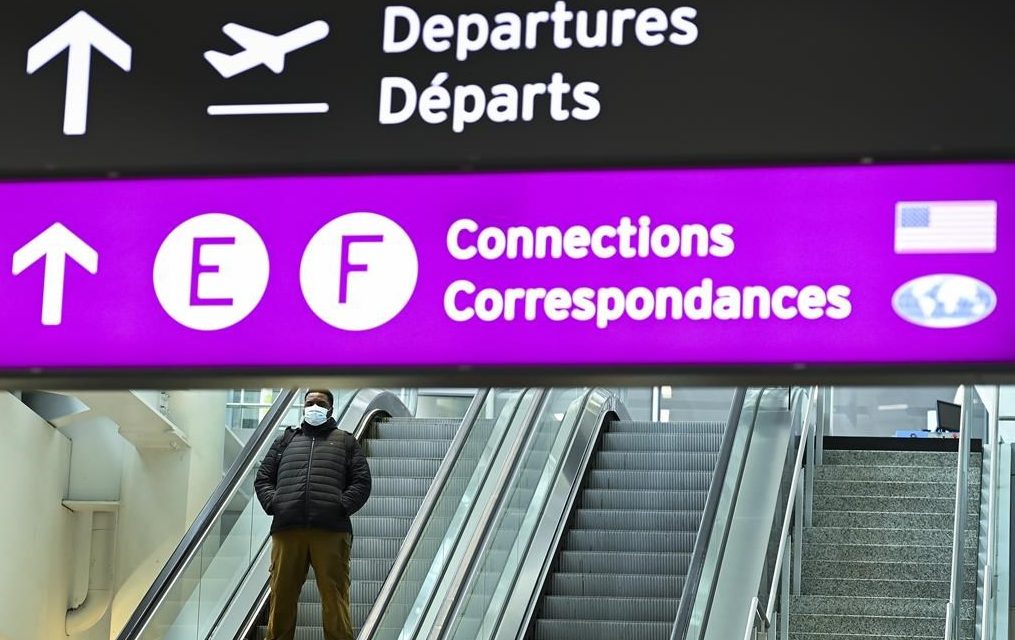
Ongoing tensions between the provinces and the federal government over the management of the COVID-19 pandemic pivoted back Tuesday to the question of whether and how border controls can be tightened to slow the spread of the virus.
Prime Minister Justin Trudeau warned Canadians to cancel any non-essential trips they have planned abroad or even within Canada in the coming weeks, as new travel restrictions are on the way. What shape they might take remains up for discussion.
“The bad choices of a few will never be allowed to put everyone else in danger,” he said at a news conference outside his Rideau Cottage home in Ottawa.
The premiers for Ontario and Quebec, however, suggested new measures could be implemented swiftly, including mandatory quarantine in hotels for returning travellers, flight bans from countries where new variants of the novel coronavirus are circulating and mandatory testing upon arrival in Canada.
“We aren’t the first country to require this and we won’t be the last,” Ontario Premier Doug Ford said during a visit to Toronto’s Pearson International Airport, where a pilot project testing some incoming travellers is underway.
“I can’t figure out for the life of me why we aren’t testing every single person that comes through this airport and the land crossings as well. We have to lock down.”
On Tuesday, the global case count topped 100 million since the novel coronavirus was first detected just over a year ago. The first cases in Canada were found a year ago this week.
So far, over 19,000 people have died and more than 753,000 have contracted the virus.
The number of cases believed to be linked specifically to travel is less than two per cent, a fact officials generally peg on a ban that’s been in place for nearly a year on non-essential travel into Canada, and the associated quarantine measures.
As of Jan. 7, people coming into Canada must also take a pre-arrival COVID-19 test.
The Canada Border Services Agency said Tuesday that since that requirement went into effect, there’s been a 33 per cent drop in international travellers arriving by air when compared to a similar time period last year.
Still, dozens of flights have arrived since that date with passengers on board who later tested positive for COVID-19.
In Alberta, where a pilot project to test some returning travellers at both the land border and at the Calgary airport has been underway since November, 1.15 per cent of tests have come back positive as of last week.
Data released Tuesday on the Toronto program, which began this month, showed 2.26 per cent of tests so far came back positive.
Wesley Lesosky, who heads a union division representing about 15,000 flight attendants at nine airlines, told the House of Commons transport committee Tuesday there should be a “serious look” at using rapid tests at airports before anyone gets on a plane.
Currently, a person departing for Canada must go and get their own test, known as a PCR, within 72 hours of their departure and provide proof of a negative result.
While non-essential travel into Canada is restricted, it is much more challenging to simply block Canadians or permanent residents from travelling abroad or returning.
Trudeau also said Tuesday commercial flights often carry cargo, so there are concerns restrictions could affect trade.
Quebec Premier Francois Legault likened the debate to this time last year, when pressure began for Trudeau to close the border due to the arrival of the pandemic in Canada.
The closures didn’t end up coming until mid-March _ after thousands of spring break travellers from Quebec had already left, and returned, kicking off the first wave of the pandemic in that province.
He said he didn’t understand why it is taking so long for Trudeau to act this time around.
“Each day there are travellers arriving, each day that goes by there’s an added risk,” Legault said in French.
“So there’s an urgency to act.”
The National Airlines Council, which represents the largest airlines in Canada, said Tuesday despite concerns about winter travel, international air service is down 90 per cent, and domestic service has been cut by 80 per cent.
Case numbers continued to come down in much of Manitoba, but officials there also want tougher border controls, and have decided to put some in place themselves _ starting Friday, all out-of-province arrivals will have to self-isolate.
Premier Brian Pallister said the move was needed given the spread of COVID-19 variants and the slowing of vaccine supplies.
No doses of the Pfizer-BioNTech vaccine will arrive in Canada this week, and there will be a reduction in deliveries next week too as the company retools a production facility in Europe.
The slowdown has seen provinces warn of running out of vaccines, and delaying second doses or even getting first ones into the arms of some priority populations, an issue they’ve blamed entirely on the federal government.
An independent effort by researchers in Saskatchewan to track vaccine delivery and administration in Canada estimates about 77 per cent of the doses received have been administered.
The federal government continued Tuesday to insist the delays won’t compromise the end goal of having all willing Canadians vaccinated by September and shortages now will be made up by a surge in deliveries in the coming weeks.

Premier Doug Ford has released a statement, calling reports that one of the doctor’s serving on the Ontario COVID-19 advisory science table was paid by the elementary teacher’s union “deeply concerning.”
Dr. David Fisman, an epidemiologist with the University of Toronto, responded to the reports with a series of tweets in which he says his work with the Elementary Teachers’ Federation of Ontario (ETFO) was “very much in the public domain and transparent” and “consistent with the scientific advice I’ve had the opportunity to offer.”
ETFO confirmed they had retained Dr. Fisman and other medical experts in the summer of 2020 as a part of a legal proceeding and he was compensated.
The union then says they have continued to consult with Dr. Fisman on the health and safety impacts of COVID-19 in schools, but he was not compensated for that guidance.
Dr. Fisman also shared two of the media releases in which he is quoted in by ETFO. In both, he is quoted as being against the reopening of schools.
The Ontario COVID-19 advisory table is a “group of scientific experts and health system leaders who evaluate and report on emerging evidence relevant to the COVID-19 pandemic to inform Ontario’s response,” according to the government’s website and is an voluntary, independent group.
The epidemiologist said when he was contacted by the media outlet regarding this story, he said he offered to resign from the COVID-19 advisory table “as to not be a distraction,” but his resignation was not accepted.
Dr. Fisman also added he offered to not be paid by ETFO in exchange for his consultation, but they “suggested to me that I was providing consulting that was valuable to them, on my free time, and it was appropriate for me to be paid.”
Premier Ford’s statement did not call for Dr. Fisman’s resignation, but said “this paid relationship raises legitimate concerns,” and they only found out through the media, not from Dr. Fisman.
“It is our expectation that all individuals act in good faith and disclose any actual or potential conflicts of interest,” read the statement.
ETFO said the provincial government was “certainly aware of the experts” they were working with and added Ford “should have known of Dr. Fisman’s work” with them.
Ford also reiterated the government’s return to school plan was safe and had been confirmed by a wide range of public health experts.
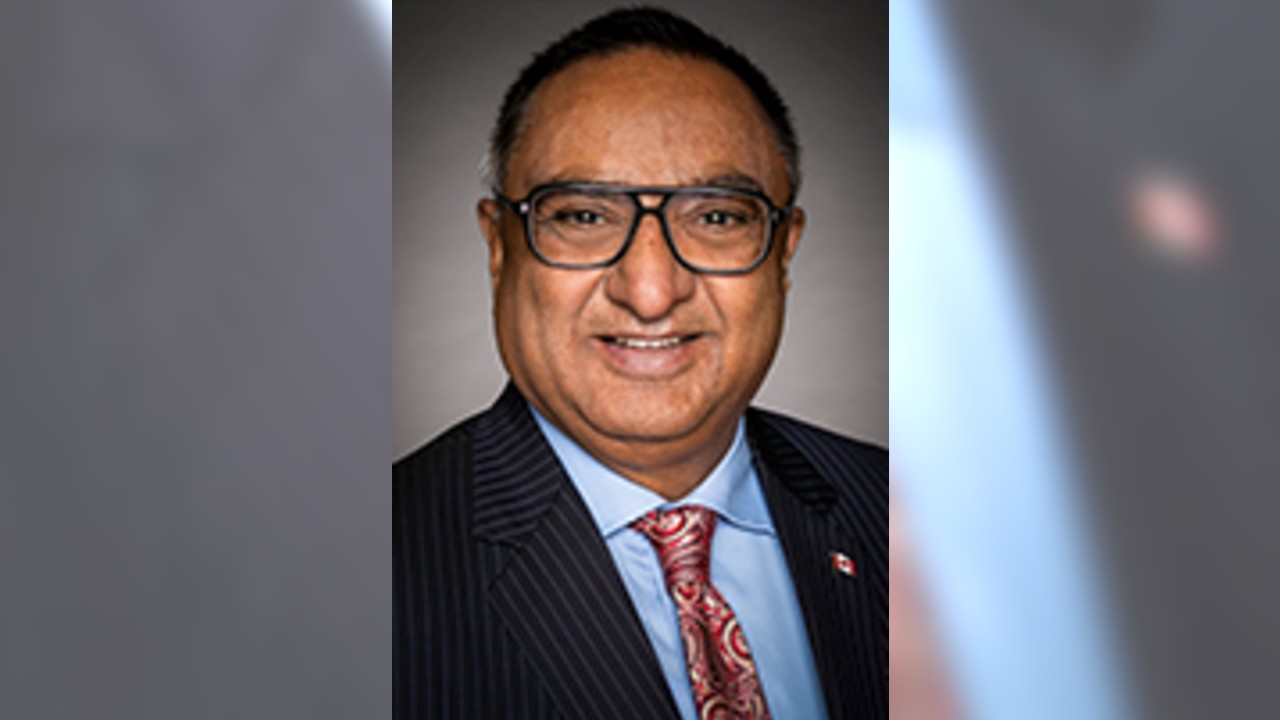
OTTAWA — Brampton Centre MP Ramesh Sangha has been kicked out of the Liberal caucus.
Government whip Mark Holland says in a statement that Sangha was removed from caucus after making what he calls “baseless and dangerous accusations” against a number of fellow Liberal MPs.
He does not specify what accusations Sangha made.
Holland says Liberals have been clear that they won’t tolerate “conspiracy theories or dangerous and unfounded rhetoric about parliamentarians or other Canadians.”
Holland adds it’s not unusual for many Canadians to “experience suspicions because of their background” and that the Liberal caucus stands firm against racism and intolerance.
Sangha was first elected as a Liberal MP in 2015.

As a result of the Pfizer vaccine shortage, the Ontario government says it is speeding up when the most vulnerable groups get their first doses by 10 days.
That means other groups deemed not as high-risk, including long-term care staff and essential caregivers, will have to wait longer to be vaccinated.
It’s a trade-off the province deems necessary due to the ongoing supply shortage.
“We have taken the approach to focus on the most vulnerable populations, in light of temporarily reduced vaccine availability from the federal government and uncertainty about the stability of supply, as well as provincial epidemiology,” the Ministry of Health said in a release.
The province said it plans to accelerate the vaccination of all long-term care, high-risk retirement, and First Nations elder care residents across Ontario, with first doses administered by February 5, 2020 — 10 days faster than originally scheduled.
The province warns that the new, faster timeline is contingent on no further delivery delays.
The Ministry will also “reallocate vaccines to ensure the 14 public health units that have not received any vaccine to date can begin to vaccinate their vulnerable populations starting this week.”
The accelerated plan will also see delays in when some receive their second doses of the Pfizer vaccine.
Outside of the most vulnerable residents, the province is extending the intervals between dose 1 and 2 for all other groups to no more than 42 days for the Pfizer vaccine. Moderna vaccinations will remain at the 28-day interval.
Because of the current Pfizer vaccine shortage, no new doses will be received in Ontario this week. Next week over 26,000 are expected to be received.
Adding to the uncertainty of vaccine supply, the province says the federal government has not given Ontario its allocated vaccines for the week of Fed. 8 or 15.
The province has administered over 285,000 doses of vaccine since it first became available.
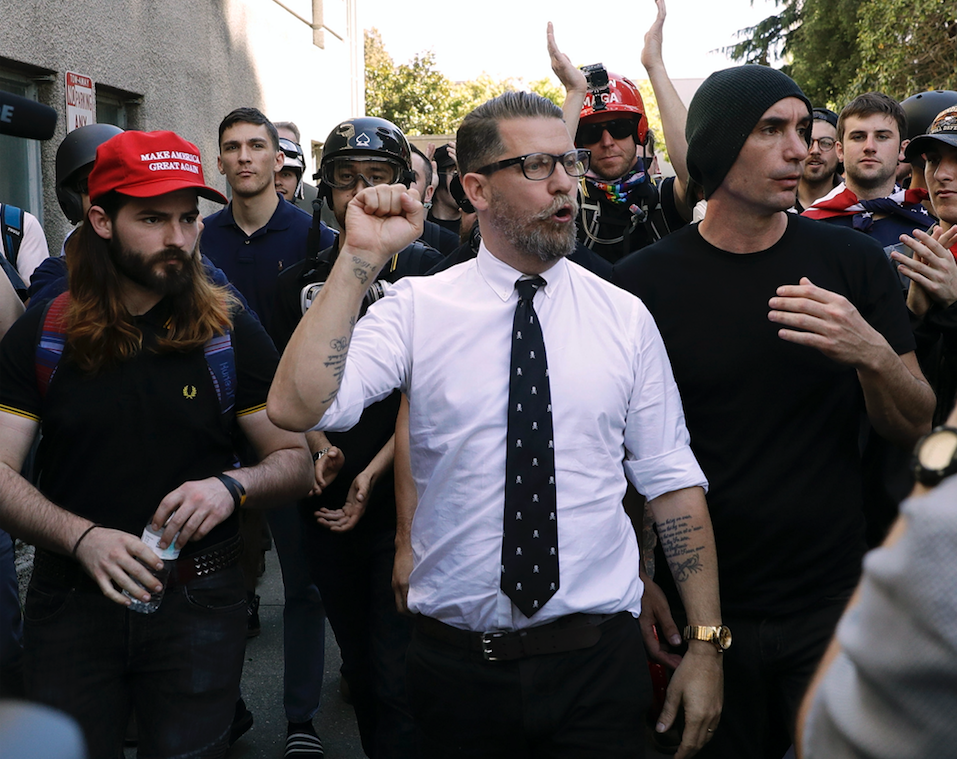
The House of Commons has passed a motion to designate the Proud Boys a terrorist entity.
The motion passed with unanimous consent, but at this point it’s not an official designation.
Public Safety Minister Bill Blair is still gathering evidence to possibly make it an official designation.
If that happens, the Proud Boys would join groups like al-Qaeda, Hezbollah and the Islamic State on Canada’s national list of terrorist organizations.
Founded by Canadian Gavin McInnes, the Proud Boys are a right-wing group that is unapologetically misogynist and increasingly linked to white supremacy and hate.
The group was banned by Facebook and Instagram in October 2018 for violating their hate policies.
The Proud Boys first made headlines in Canada when several self-identified members in the Royal Canadian Navy disrupted an Indigenous protest in Halifax in 2017, and has since grown its international profile and membership.
Several members were reportedly among those who stormed Capitol Hill in Washington, D.C., following a speech by Donald Trump last week.

WASHINGTON — House Democrats delivered the impeachment case against Donald Trump to the Senate late Monday for the start of his historic trial, but Republican senators were easing off their criticism of the former president and shunning calls to convict him over the deadly siege at the U.S. Capitol.
It’s an early sign of Trump’s enduring sway over the party.
The nine House prosecutors carried the sole impeachment charge of “incitement of insurrection” across the Capitol, making a solemn and ceremonial march to the Senate along the same halls the rioters ransacked just weeks ago. But Republican denunciations of Trump have cooled since the Jan. 6 riot. Instead Republicans are presenting a tangle of legal arguments against the legitimacy of the trial and questioning whether Trump’s repeated demands to overturn Joe Biden’s election really amounted to incitement.
What seemed for some Democrats like an open-and-shut case that played out for the world on live television, as Trump encouraged a rally mob to “fight like hell” for his presidency, is running into a Republican Party that feels very differently. Not only are there legal concerns, but senators are wary of crossing the former president and his legions of followers — who are their voters. Security remains tight at the Capitol.
Sen. John Cornyn, R-Texas, asked if Congress starts holding impeachment trials of former officials, what’s next: “Could we go back and try President Obama?”
Besides, he suggested, Trump has already been held to account. “One way in our system you get punished is losing an election.”
Arguments in the Senate trial will begin the week of Feb. 8, and the case against Trump, the first former president to face impeachment trial, will test a political party still sorting itself out for the post-Trump era. Republican senators are balancing the demands of deep-pocketed donors who are distancing themselves from Trump and voters who demand loyalty to him. One Republican, Sen. Rob Portman of Ohio, announced Monday he would not seek reelection in 2022, citing the polarized political atmosphere.
For Democrats the tone, tenor and length of the upcoming trial, so early in Biden’s presidency, poses its own challenge, forcing them to strike a balance between their vow to hold Trump accountable and their eagerness to deliver on the new administration’s priorities following their sweep of control of the House, Senate and White House.
Biden himself told CNN late Monday that the impeachment trial “has to happen.” While acknowledging the effect it could have on his agenda, he said there would be “a worse effect if it didn’t happen.”
Biden said he didn’t think enough Republican senators would vote for impeachment to convict, though he also said the outcome might well have been different if Trump had six months left in his term.
In a Monday evening scene reminiscent of just a year ago — Trump is now the first president twice impeached — the lead prosecutor from the House, this time Rep. Jamie Raskin of Maryland, stood before the Senate to read the House resolution charging “high crimes and misdemeanours.”
Earlier, Senate Majority Leader Chuck Schumer said failing to conduct the trial would amount to a “get-out-jail-free card” for others accused of wrongdoing on their way out the door.
Republicans appear more eager to argue over trial process than the substance of the case, he said, perhaps to avoid casting judgment on Trump’s “role in fomenting the despicable attack” on the Capitol.
Schumer said there’s only one question “senators of both parties will have to answer before God and their own conscience: Is former President Trump guilty of inciting an insurrection against the United States?”
On Monday, it was learned that Chief Justice John Roberts is not expected to preside at the trial, as he did during Trump’s first impeachment, potentially affecting the gravitas of the proceedings. The shift is said to be in keeping with protocol because Trump is no longer in office.
Instead, Sen. Patrick Leahy, D- Vt., who serves in the largely ceremonial role of Senate president pro tempore, is set to preside.
Leaders in both parties agreed to a short delay in the proceedings that serves their political and practical interests, even as National Guard troops remain at the Capitol amid security threats on lawmakers ahead of the trial.
The start date gives Trump’s new legal team time to prepare its case, while also providing more than a month’s distance from the passions of the bloody riot. For the Democratic-led Senate, the intervening weeks provide prime time to confirm some of Biden’s key Cabinet nominees.
Sen. Chris Coons, D-Del., questioned how his colleagues who were in the Capitol that day could see the insurrection as anything other than a “stunning violation” of the nation’s history of peaceful transfers of power.
“It is a critical moment in American history,” Coons said Sunday in an interview.
An early vote to dismiss the trial probably would not succeed, given that Democrats now control the Senate. The House approved the charge against Trump on Jan. 13, with 10 Republicans joining the Democrats.
Still, the mounting Republican opposition to the proceedings indicates that many GOP senators will eventually vote to acquit Trump. Democrats would need the support of 17 Republicans — a high bar — to convict him.
One by one, Republican senators are explaining their objections to the unprecedented trial and scoffing at the idea of trying to convict Trump now that he’s no longer in office.
Rand Paul of Kentucky said that without the chief justice presiding the proceedings are a “sham.” Joni Ernst of Iowa said that while Trump “exhibited poor leadership,” it’s those who assaulted the Capitol who “bear the responsibility.” New Sen. Tommy Tuberville of Alabama said Trump is one of the reasons he is in the Senate, so “I’m proud to do everything I can for him.”
Sen. Tom Cotton, R-Ark., is among those who say the Senate does not have the constitutional authority to convict a former president.
Democrats reject that argument, pointing to an 1876 impeachment of a secretary of war who had already resigned and to opinions by many legal scholars. Democrats also say that a reckoning of the first invasion of the Capitol since the War of 1812, perpetrated by rioters egged on by a president as Electoral College votes were being tallied, is necessary.
A few GOP senators have agreed with Democrats, though not close to the number that will be needed to convict Trump.
Mitt Romney of Utah said he believes “what is being alleged and what we saw, which is incitement to insurrection, is an impeachable offence. … If not, what is?” Romney was the only Republican senator to vote for conviction when the Senate acquitted Trump in his first impeachment trial.
___
Associated Press writer Hope Yen contributed to this report.
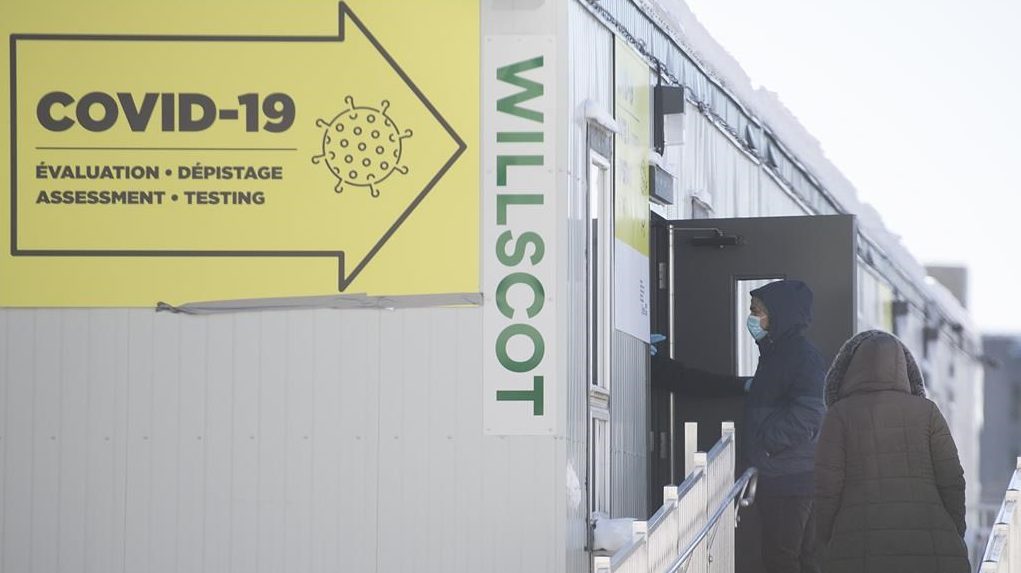
It’s still too soon to know whether the recent downward trend in new COVID-19 cases will continue, Canada’s chief public health officer said Sunday as several provinces grappled with outbreaks that threatened to derail their fragile progress.
Dr. Theresa Tam said there’s been an improvement in the COVID-19 numbers in British Columbia, Alberta, Ontario and Quebec, but the disease is regaining steam elsewhere.
“While community-based measures may be starting to take effect in some areas, it is too soon to be sure that current measures are strong enough and broad enough to maintain a steady downward trend across the country,” she wrote in a statement.
Some long-standing virus hot spots have made headway in lowering the number of new cases in recent weeks, but are still fighting outbreaks and flare-ups as they race to vaccinate vulnerable communities.
The federal public safety minister announced Sunday that the Canadian Armed Forces will support vaccine efforts in a large swath of northern Ontario.
Bill Blair said on Twitter that armed forces personnel will support vaccine efforts in 32 communities of the Nishnawbe Aski Nation, a collection of 49 First Nations spanning about two thirds of the province.
The military has previously been asked to help with the vaccine rollout in First Nations communities in Newfoundland and Labrador and Manitoba.
In a statement, Tam said the prospect of vaccines has offered Canadians “hope that the end of the pandemic is in sight.”
But in the meantime, she stressed that all Canadians need to keep following health measures, even after they’re immunized.
She said following public health measures will also reduce the spread of new variants of COVID-19, including the ones identified in the U.K., Brazil and South Africa.
